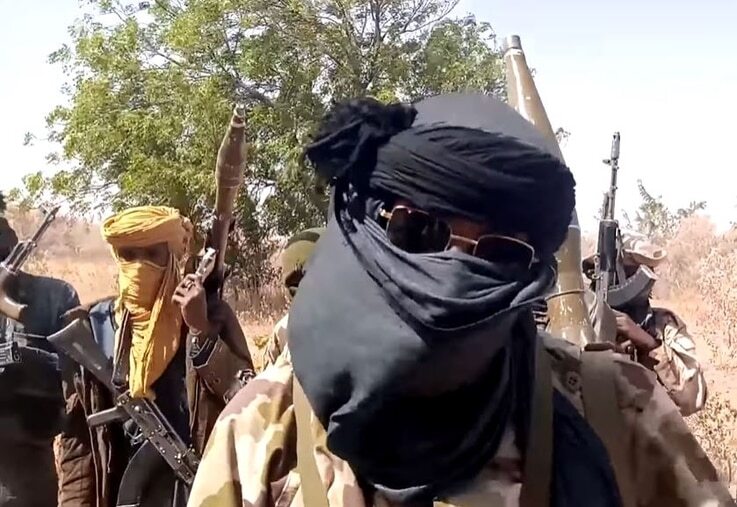THE WHISTLER INVESTIGATION: Banditry In Nigeria: How Security Agencies Aid Illegal Arms Supply (Part 1)
Paru is a sleepy, dusty little town in Niger Republic on the northern fringes of Katsina State. It is less than one kilometre to Nigeria’s Magama-Jibiya main border control post in Katsina State. Here, dozens of trucks are loaded with assorted contraband including foreign rice, noodles, vegetable oil and second hand clothing among others. It is also a loading point for dutiable goods.
But when many of the vehicles take- off to Nigeria, they meander their ways through nearly a dozen unapproved routes where they do not have to do any documentation or pay approved duties. On those routes, you would not find a customs or immigration officer, but may encounter their boys who mount “check points” to collect bribes from smugglers.
Advertisement
On February 9, when this reporter visited, the borders were still officially closed, having been ordered shut along with other land borders by the Federal Government since August 2019. But the closure had not affected the smuggling business.
This reporter chartered a vehicle and passed through one of the bigger and popular smuggling routes from Niger Republic to Katsina called the Kurama route. We drove from Magama, in Nigeria, up to Paro, a distance of about three kilometres, meandering through the Savannah landscape and finding no security post. But about 200 metres to Niger, we found six Nigerian officials sitting idly with some playing cards.
They stopped and asked where we were going and I said we were going to Niger for visit. We were allowed to pass without anyone checking the car, although they asked the driver to “drop something.” We met another point where two customs officer were seated and the drill was similar. They also allowed us to pass. We entered Paru and saw trucks being loaded without any security operative in sight. We covered a distance of about three kilometres to get to the town.
We returned through another route that is less than 100 metres from Nigeria’s border post and encountered only one “check point” where an immigration officer in uniform sent his “Camp boy” (miscreant) to collect money from the driver and we drove off into Katsina.
Advertisement
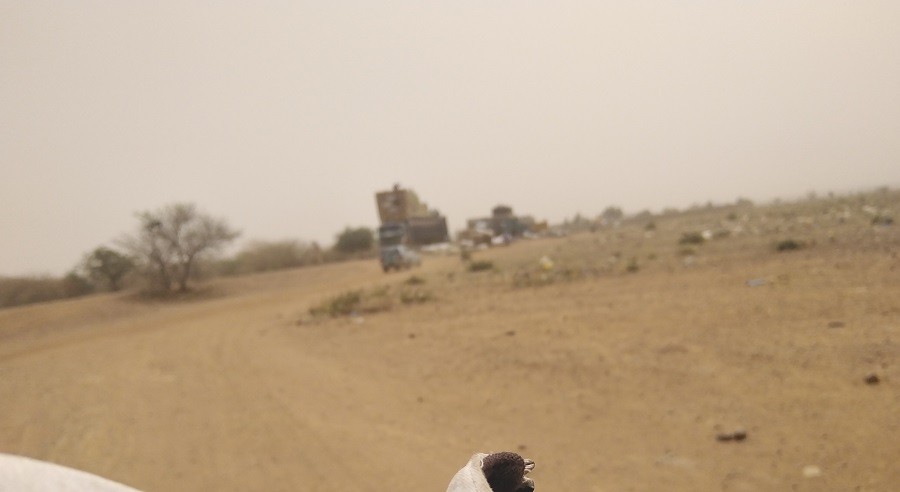
Paru is a roadside town along the highway that leads from Nigeria’s border post at Magama straight to Maradi in Niger Republic. Maradi is the second largest city in Niger with the Hausa/Fulani as the predominant ethnic group. This is the city where illegal arms supply to bandits in Northern Nigeria are planned and ferried through unauthorized dozens of routes into states sharing borders with Niger -Zamfara, Katsina and Sokoto.
This was confirmed by a leader of the bandits group in Makkai Forest, Turji Katchala, in Shinkafi Local Government when Sheikh Ahmad Gumi met with them recently during a tour to resolve the problem of banditry in the North. A source in the entourage told THE WHISTLER that Katchala disclosed to the group that the arms and ammunitions used by them were brought in from Maradi and delivered to the bandits with support of Nigeria’s security operatives who allowed safe passage.
A major entry point from Niger is Zurmi, a local government town in Zamfara which has become an arms smuggling route. The town shares border with Niger Republic and Katsina while its forest terrain offer the right cover for arms smuggling into Nigeria. From here arms get into Zamfara, Katsina, Kano, Kaduna and Sokoto states.
A 2016 report filed by a Nigerian Army officer on international duty in Morocco seen by THE WHISTLER had also alerted military authorities to the dangers coming from Nigeria’s borders with Niger, Chad and Cameroun. The report said leaders of a the Frente Polisario Military Forces had alerted the United Nations troops to a thriving arms smuggling business by “well-structured criminal and terrorist groups” across Mali, Mauritania, Niger and Chad.
Advertisement
When operatives of the Katsina Police Command arrested a notorious bandit who stockpiled arms inside a hole in his house in Maduru village, Mani Local Government Area of the state in early January this year, he confessed to the police that his arms supplier was one 47-year-old Haruna Yusuf. Yusuf, a Katsina indigene from Kaita, told the police that he usually received his arms supply from Niger and hands over to his boys who take them to bandits in different forests with security personnel providing cover.
The police claimed to have arrested 12 other accomplices, including two sons of YusuF. But more than one month after, they are yet to be prosecuted.
THE WHISTLER met the state Commissioner of Police, Sanusi Buba, in his office to find out what has happened to the bandits and gun runners the command arrested since early January. After a slight hesitation, Buba said: “Yes, we arrested suspects in illegal dealing in arms into states affected by banditry and you know it’s a serious offence. We have to be very painstaking in our investigations so that it can possibly lead us to other groups that may be involved in this dastardly act. So we’re still investigating.”
Confessions Of A Customs Officer- ‘We Leave Our Posts When Its 6pm’
This reporter was introduced to a senior Customs Officer (an Assistant Superintendent of Customs 1) at one of the border posts in Katsina as a PhD researcher on border management and proliferation of arms. He is a northern officer posted to Katsina in February 2020.
The officer took the reporter to his room and said he would speak “honestly about what I know and have seen since I came here.” Although he didn’t appear to have any suspicion about the reporter, he did not allow any recording of the conversation. He complained about the attitude of some of his colleagues who connive with smugglers to bring contraband into the country.
Advertisement
He however said he would not allow any contraband, including rice or second hand clothes to cross his border post, which is just a stone’s throw to one of the popular routes to Niger. “You, know we’re different. Some people are after the money and would do anything. Some even leave their posts to go to other border posts to facilitate smuggling,” he disclosed.
He also disclosed that arms and ammunitions from Niger are smuggled through forest routes manned by soldiers, who are either unable to stop it or are conniving with the bandits. “There’s no way the bandits will not encounter Military personnel who are manning major routes into and out of the forests in Zamfara and Kaduna states,” he said, adding that the bandits are so well established in the forest communities that it would be difficult for the poorly armed soldiers to dislodge them in the event of a military confrontation.
As he was talking, he was also glancing at his wrist watch. “Once its 6 pm now, I will leave this post. Everyone will leave their border posts including the police and soldiers,” he revealed. He said “there was a circular since last year before I came that Customs and other security personnel should leave their posts by 6pm because bandits were attacking and killing them.”
He said it looked as if arms smugglers were using bandits to clear the road for them to bring arms into Katsina and Zamfara. “Two weeks ago, there was an attack on my post here by smugglers and it was God that saved me.”
Nigeria Customs Headquarters Keeps Mum
Joseph Attah, an assistant comptroller and spokesman of the Nigeria Customs Service, was unwilling to grant any interview when asked to react to claim that officers leave their border posts in the northwest by 6pm. He said he was busy preparing for a meeting with a minister. “What value would that add to report such things,” he asked before adding “may be it is a survival strategy in that zone. Every zone has their strategies.”
He walked out of his office ignoring my insistence for a formal interview
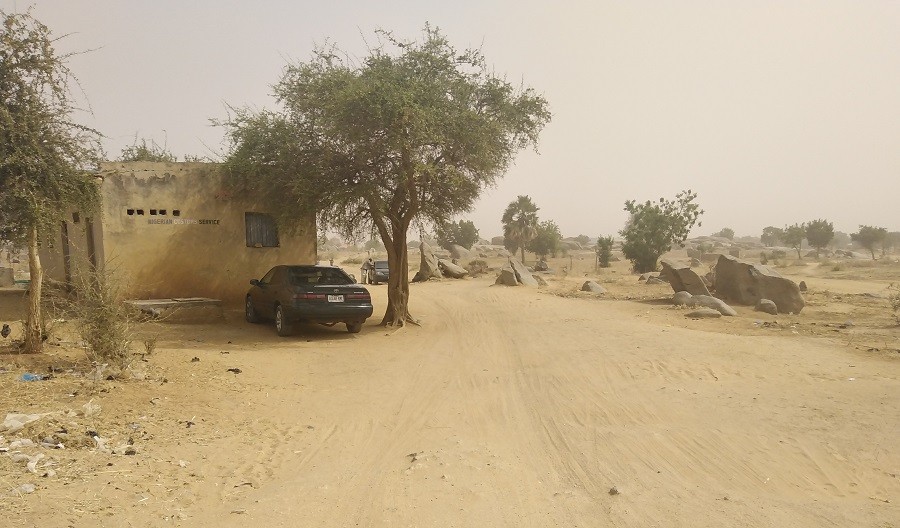
He said further that it’s going to be difficult to stop smuggling, especially in Katsina where he said there were more than 200 illegal routes. “In fact, no one can tell you the number of illegal routes because smugglers can pass anywhere they like,” he stressed.
How To Get A Gun
Nigeria’s The Firearms Act (2004) stipulates the Inspector General of Police (acting on behalf of the president) as the only authority to grant gun licence and sets stringent conditions. The Act prohibits the police from issuing firearms licence to any Nigerian who is of unsound mind, has defective eyesight, intemperate habits or one who “has during the previous five years been convicted of an offence involving violence or the threats of violence.”
But while the conditions for acquiring a gun have been made tough by the government, it is however not difficult to become a documented gun owner in Nigeria. All it takes is for you to approach “the right” personnel in the Nigeria Police Force. In actual fact, they would be willing to “help” you acquire a gun, as THE WHISTLER investigation has shown.
At The Police Command Headquarters
I walked into the headquarters of the Katsina State Command of the NPF to enquire about how to get a gun. I walked through the well policed gate but no one stopped to ask me who I was going to see. I strolled into the premises and stopped a police inspector (name withheld).
“Sir, please I’m making enquiries about how to acquire a gun,” I said gently, after pleasantries.
The officer looked at me and after a few seconds said “Gun! You have to apply and write to the commissioner who would approve first before directing you further.”
But I told him that may take a long time, and pleaded with him that I needed it fast. Then he went inside an office to consult another officer before coming back to me.
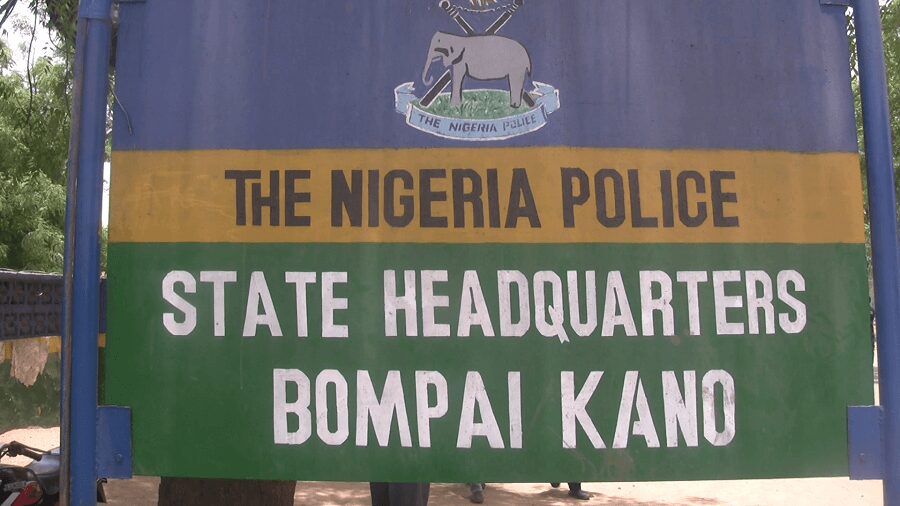
“Go and see (name withheld) in that office. Just ask for him and tell him what you want,” he said, pointing at a one-story building adjacent his own.
Then I approached the building and an officer in suit stopped me and requested my mission. I mentioned the name of the officer I came to see and he directed me upstairs after respectfully telling me to wear my facemask.
I Knocked at the door and was asked to come in. I met a man in mufti who welcomed me warmly after I told him who directed me. He asked what I wanted and I told him I came to acquire a gun for an uncle who would like to purchase a gun to protect himself.
He asked me his location and I told him he lived in Bichi-a small town in Kano State. He thought about it for a while and said, “If he lives in Kano State I can direct you to an officer at the Kano Command who would do it for you.”
I said I preferred to get it in Katsina if he could help me. He said the gun dealer that used to supply them had closed his shop in Katsina after police and DSS personnel started troubling him, adding that the man lives in Kano.
When I requested for the dealer’s contact, he said “Just see the officer, he would do it for you. He would give you the form to fill and link you with the dealer.”
I asked whether it would be difficult to reach the dealer. “You know they have gone underground now. If it was before it was not difficult,” he replied. I asked for his telephone number and gave him mine, promising to call him back if I encountered any problem.
At The Kano Police Command
The next day I walked into the NPF, Kano State Command. I was stopped at the gate and asked about my mission. I mentioned the name of the officer I was directed to meet, and the policeman allowed me in, pointing at the direction of the office.
I met a man outside the office and asked to see the officer. He asked me whether I could recognize him and I said I had never met him. He pointed at a man in long caftan having a meal on his table. There were two other men in mufti in the room so I introduced myself and requested to see him in private. He promptly obliged.
I told him what I wanted and who sent me to him. He immediately put on an incredulous look and asked me why the officer in Katsina did not call him to inform him ahead of my coming. I had no answer for that, although I mumbled a response.
“There’s no gun now. The dealers have sold their stock and they have challenge importing new ones,” he told me in Hausa. He was unwilling to say anything more. When I asked if there were other options to acquire the gun, he said he didn’t know.
What about if I want guns made locally? He said, “There’re guns everywhere but we only deal with licensed dealers. But you can’t even get those ones now. There’s nothing I can do.”
Commissioner Of Police Reacts
The Commissioner of Police, Katsina State, Sanusi Buba, was asked if someone in need of a gun can walk into a police station to get one. Again after hesitation he said, “That question is out of place because there’s no history of any policeman, soldier or security agency selling guns.
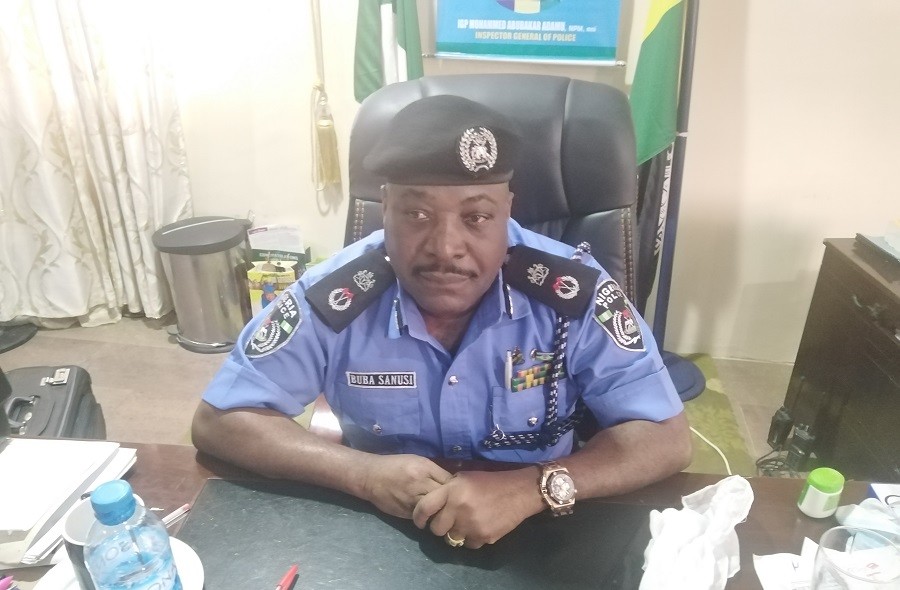
“I have said it that these guns are gotten through illicit ways, illegal international gun running markets. These arms are smuggled from Niger. And from what we gathered, the original sources of these weapons are from Libya, Mali and other countries bordering Niger. And Because of the porous nature of the borders, it’s going to be an extremely difficult task to deal with but we’re going to ensure that we remain committed.
“We have fantastic synergy with other sister organizations; we also have working relationship with sister security organizations in Niger Republic.”
Gun Markets In Nigeria
THE WHISTLER followed up intelligence that some industrial weapons are fabricated in clandestine blacksmiths’ workshops found in major markets and locations across the country. Security sources revealed that personnel who lost their rifles usually patronize local producers who have become more sophisticated and could produce a replica of most imported guns.
So, I visited the Panteka Market in Kaduna, a huge blacksmiths’ market where aluminum and steel products are fabricated and sold.
I veered into the market and entered a workshop where three young boys (below 20 years) were slicing steel sheets. They stopped the work to attend to me. I asked if they knew anyone who could fabricate guns for me. I said I was the leader of a vigilante group in my community.
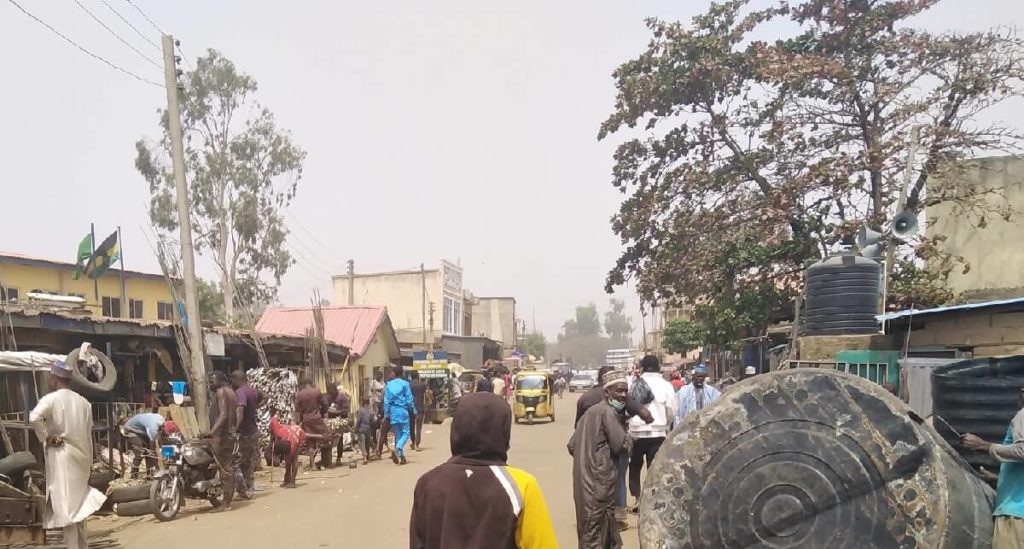
The kids exchanged glances, and appeared to review their memories. Then one of them, the eldest, said in Hausa: “I’m not sure we have gun fabricators in this market.” But almost immediately, the youngest of the three said, “There’s a man I know here but he no longer operates in this market. He’s at Rigasa.” But he couldn’t give any address or name.
I turned into a corner and entered another shop where a middle-aged man was frying some aluminum foil. He stopped and I asked in Hausa, “Please where can I get those who can make guns for me? I was directed to this market from Zaria.” He gazed at me for almost a minute before saying, “The security people have driven them underground and they’re no longer in the market.”
Then he said, “Go to that street (pointing at a bend about 70 metres away) and ask for Seriki Makira. If you don’t see him you may see his boys.”
Someone pointed at his workshop and I went inside. I met a young man (probably 32) struggling with a steel pipe inside burning coal. After explaining my mission, he said, “We don’t produce guns, we only fabricate some parts such as the barrel. We just make it for them and they go with it.” He said most of his clients were members of local vigilante groups and other individuals.
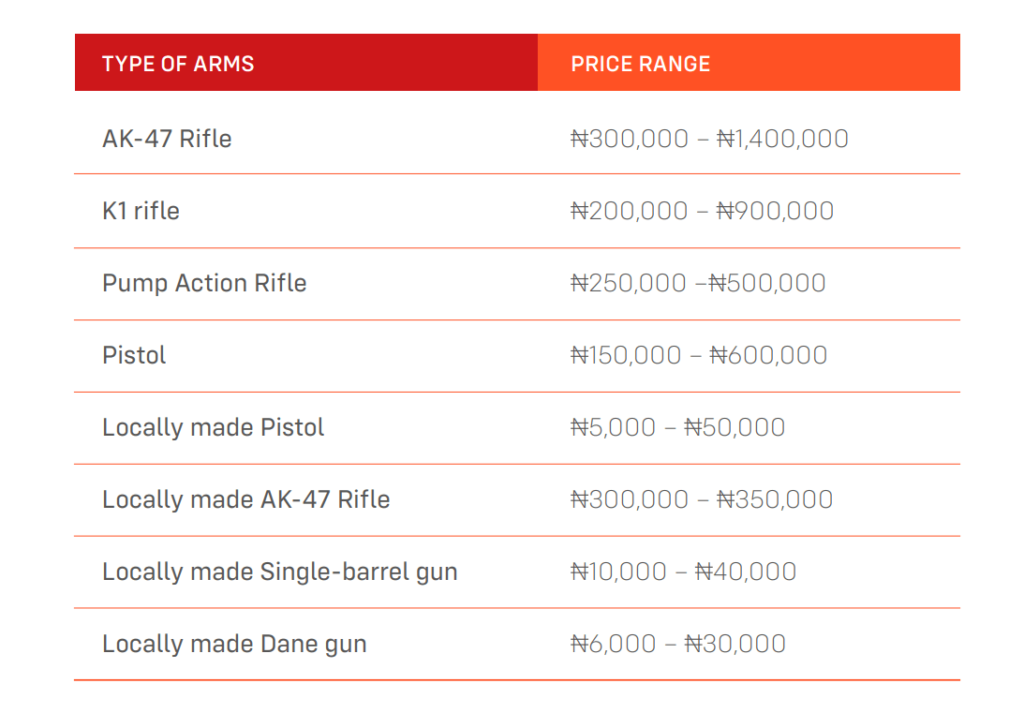
He appeared busy and quickly went back to his job. His shop is less than 60 metres from the Nigerian Police Area Command office opposite the market.
A 2018 report of Small Arms Survey revealed that the number of small arms in circulation in Nigeria, in the hands of civilian non-state actors is estimated at 6,145,000, while the armed forces and law enforcement collectively account for 586,600 firearms. The report also said that recorded data at the various ports of entry into Nigeria does not correlate with estimates on the volume of arms in circulation in the country.
A 2015 survey by Presidential Committee on Small Arms and Light Weapons (PRESCOM) revealed that about 60 per cent of the illegal arms in the Southeast zone of the country were produced locally. It said while some communities are traditionally known for their weapon craft, is added that politicians were part of arms proliferation in the area and most of the political leaders helped in the importation and fabrication of arms.
Trade in small arms exists in major markets such as the Ariaria Market in Aba, Abia State and the Onitsha Main Market in Anambra State.
The Small Arms Survey in the four states of Adamawa, Anambra, Benue and Plateau showed that a significant amount of illegal weapons in the hands of civilians were locally produced. In Adamawa it constitutes 32%; Anambra 48%; Benue 62% and Plateau 69%.


